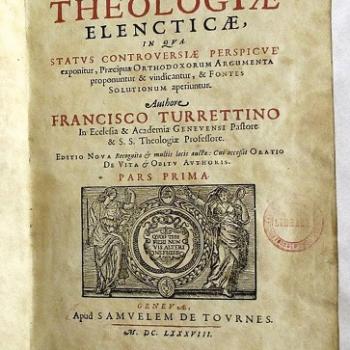
Atheist anti-theist Jonathan M. S. Pearce is the main writer on the blog, A Tippling Philosopher. His “About” page states: “Pearce is a philosopher, author, blogger, public speaker and teacher from Hampshire in the UK. He specialises in philosophy of religion, but likes to turn his hand to science, psychology, politics and anything involved in investigating reality.” His words will be in blue.
This is my fourth piece on Doubting Thomas and third in response to Jonathan. See the previous installments:
Pearce’s Potshots #17: Doubting Thomas & an “Unfair” God [3-17-21]
Debate w Atheists: Doubting Thomas & an “Unfair” God [3-17-21]
I am presently responding to his post, Doubting the Lessons from Doubting Thomas: Responding to Dave Armstrong Again (3-18-21).
***
I started off this debate the other day with a short piece about the unfairness of the distribution of evidence as exemplified by the Doubting Thomas episode in John. Catholic Dave Armstrong replied, and I duly responded. I then finally found a comment in one of my threads, by Dave, that actually dealt with my points in some way (a novel idea, I know), so have decided to look at that.
Delighted that you think I have actually replied to one of your points. I’m still waiting to experience the same pleasure on this end. :-)
It was a comment in reply to Geoff Benson who also noticed how Armstrong failed to deal with my points in any substantive way… Please read those previous pieces for context.
And of course many of my readers will likewise feel that you have been tiptoeing around all of my arguments thus far. Perhaps this will be the exception (“dear Lord please!”). Hope springs eternal.
Over to Armstrong:
I think God does provide sufficient evidence (of all sorts) for every human being, but human beings have various mechanisms by which they rationalize such things away or reject them. If it’s not efficient enough to bring about belief (I’m not a Calvinist and believe in human free choices and free will) then one can either criticize God or point out that perhaps the person involved has an irrational demand. The fault can conceivably be on either side. God’s not to blame for everything (as many of His critics seem to think).
This is actually contradictory. “Sufficient” does not entail a range. Sufficient means “enough for a particular purpose”. If I need to put oil in my car for the engine to run, then I put in, say, 1 litre. Ceteris paribus, this is sufficient. Of course, if my car has a hole in a pump somewhere, then this is not sufficient. To get to the next town, I need to put in 2 litres to overcome the leak. 2 litres is the sufficient (i.e., required) amount. 1 litre is not sufficient. It should be sufficient if we made inaccurate assumptions about my car by comparing it to another car of the same make and model, but without the leak.
Ceteris paribus.
All other things remaining equal.
But…all other things are not equal. They almost never are.
So, a sufficient amount of oil will change from car to car (as well as the type of oil).
Sufficient evidence (and type of evidence) will change from person to person, no matter what the belief you are talking about.
Yes, exactly (to the last sentence). This is what I am saying: “I think God does provide sufficient evidence (of all sorts) for every human being”: meaning that He considers each person in their uniqueness and communicates to them enough for them to know (taking into account their particular background and outlook) that He exists and that He gives grace for salvation, and indeed is the key to human joy and fulfillment, and happiness.
What Dave is erroneously saying is that 10 units of evidence that the moon landings never happened is sufficient for Harry to believe in the conspiracy theory; therefore, 10 units of evidence is sufficient for Julie.
That’s not my position, as explained, though I can see that how I worded it there might give someone an impression that I meant “one size for all” or suchlike.
But Julie is a scientist and a skeptic whose uncle worked on the NASA team. 10 units simply isn’t sufficient for her.
This is skeptical thinking 101.
We have no disagreement on this particular matter. You have misunderstood me. I take my share of the blame if I wasn’t clear or precise enough in my words. Now I have now clarified, in any event. It’s great to be able to agree on something besides “2+2=4” and “water is wet.”
Dave’s contradiction is obvious:
I think God does provide sufficient evidence (of all sorts) for every human being, but human beings have various mechanisms by which they rationalize such things away or reject them.
should be translated as:
I think God does provide sufficient evidence for every human being, but all humans are different meaning that the evidence isn’t actually sufficient.
Or A ≠ A.
Since I was misunderstood, no contradiction has been shown.
Which he almost begrudgingly accepts, and then says of the entity who knowingly created and designed everything in existence in the full knowledge it would do what it would do because he designed it that way:
The fault can conceivably be on either side. God’s not to blame for everything (as many of His critics seem to think).
I utterly contest that claim. He needs to explain that in light of classical theism and OmniGod. See:
- God’s Divine Foreknowledge, His Culpability and the Problem of Evil
- The Problem with Prophecies and Foreknowledge
- Divine Foreknowledge and Free Will
Ah, links, huh? I’ll respond the same way you responded to my links in one of my replies (“I’ll ignore the long tirade of articles Armstrong offers . . .”). Maybe your “tirade” is smaller in number, but following your methodology, I’ll ignore them, just as you did, mine. So, moving on . . . Seriously, though, free will and foreknowledge, etc., is a huge, huge topic in and of itself. At some point it should be discussed, but it’s too “large and lumpy” to visit in the midst of this “unfair God” accusation under present consideration. Moreover, if you haven’t yet correctly understood my present argument, it would be unfruitful at this juncture for us to venture into predestination, since that is a way deeper and complex topic (among the most difficult in theology).
He continues, unabated:
I think Jesus appeared to Thomas because He knew (knowing all things) that he would respond to such an appearance. But not everyone would or does, as Jesus Himself taught in Luke 16. Therefore, it follows that God would not be required to provide spectacular confirmations to all and sundry. Most of them won’t accept it anyway, and God knows that. A consistent theme in the New Testament is that Jesus performed miracles and taught without parables with and to those He knew would be receptive to both. Hence we have passages like these:
Whoah there. Let’s unpick this theological hot mess[.]
Sure; why not?
So, Thomas was at evidence level 90%, but needed to reach a really really high threshold of 95% to believe. God decided to allow hi[m] this. Dave seems to be on board with this.
But not everyone needs 95%.
Sure.
So God doesn’t allow supernatural evidence for them.
Sure.
But some do. And God doesn’t do that for them. This is the crux of the unfairness argument, and I think Dave secretly gets this, but is struggling to wriggle his way out of it.
People have many many different outlooks and presuppositions; therefore, lesser or greater needs for particular forms of evidence and proofs and indications of any given thing (not all of which are empirical). God meets each of them where they are at (this is what we Christians believe). You’re critiquing our view as inconsistent and incoherent, and I keep saying you are mistaken as to what it is in the first place. You have to get it right before you set out to criticize it.
It’s not about providing supernatural evidence to all and sundry (though Thomas got it, so why shouldn’t everybody?), but sufficient evidence for everyone. Time to continue our analogy.
Exactly. God does that. And many people reject it. The atheist never seems o take into account that something could be objectively evident, but blown off due to emotional or presuppositional hostility, or any number of false notions that work against acceptance.
If I fully designed the transportation network from scratch, and I wanted my vehicles to run smoothly, I would probably design them without needing oil. But if that was somehow necessary, I would make sure they all ran optimally, not having inconsistency across the fleet. There would be sufficient oil need and provision for all vehicles.
As indeed there is, But because of human free will, we have the freedom to pursue erroneous ideas and go down wrong paths of thinking and behaving. And these work against the knowing of God: both His existence and Him, personally. The “God” that atheists reject (and I know something about that, having debated scores and scores of them) is an entity that I don’t know at all. It certainly ain’t the biblical God. It’s a gross distortion of Him, and a ridiculous caricature. That (not the one true God) is what is rejected. And so with this massive amount of ignorance, there is hope that the atheists in bondage to such ignorance and folly can eventually see the light.
Matthew 13:58 (RSV) And he did not do many mighty works there, because of their unbelief.
Mark 8:11-12 The Pharisees came and began to argue with him, seeking from him a sign from heaven, to test him. [12] And he sighed deeply in his spirit, and said, “Why does this generation seek a sign? Truly, I say to you, no sign shall be given to this generation.”
Which is to admit double standards. God/Jesus did do mighty works for Thomas because of his unbelief. A sign was given to “this generation”: hence the Resurrection and the Gospels!
Hogwash. What you don’t get (and what I have explained in these four responses) is that Jesus knew beforehand who would respond to His message or miracles and who would not. He knew Thomas would, so He appeared to Him. He knew that most of the Pharisees and scribes who opposed Him would not accept His message or miracles and so He wouldn’t do them or communicate the gospel to them. With individuals like Simon the Pharisee or Nicodemus, He would (knowing their hearts).
So it’s no unfairness at all. It’s just having more knowledge than we do. If the Pharisees saw Jesus perform a miracle, they simply concluded that he cast out demons by the power of other demons (to which Jesus replied, “a house divided against itself cannot stand”). When He claimed to be God, they accused Him of lying and blasphemy. This is the sort of thing atheists do: having rebelled against God and the Christian belief and behavior system, they come up with inadequate, failed rationalizations to reject all of it.
This doesn’t make much sense, I’m afraid.
Not to you, because you have predetermined (burdened by your many false premises and misconceptions) that it can’t from the outset. Nothing is ever good enough or sufficient enough.
Then Dave tried some tit-for-tat responding to Geoff and went rather off-topic to Tired Tropesville to discuss Einstein’s religious beliefs.
He introduced that topic, by writing “I would also take issue with the claim that Einstein wasn’t an atheist.” I happen to know that indeed he wasn’t, from his own words, and so I replied. If I hadn’t, then you’d be sitting there (or else one or more of your angelic, acid-tongued minions in your comboxes) claiming that Geoff scored this huge “victory” and shut me up. Instead, you come up with yet another of your colorful, cynical descriptions which caricature what I actually did (“Tired Tropesville”). It’s just silly. Again, understand a thing first before setting off to deride “it.” That’s universal advice we can all seek to live by.
The key to understanding any of this (and you can apply this to my teacher or transport analogies) is: “What is God’s goal in creation?”
The Bible is quite clear:
2 Peter 3:9 (RSV) The Lord is not slow about his promise as some count slowness, but is forbearing toward you, not wishing that any should perish, but that all should reach repentance.
Matthew 23:37 “O Jerusalem, Jerusalem, killing the prophets and stoning those who are sent to you! How often would I have gathered your children together as a hen gathers her brood under her wings, and you would not!”
John 5:40 yet you refuse to come to me that you may have life.
As I say, morality is goal-oriented. Purpose is goal-oriented. For God, why he would do anything that seems unfair is a version of the problem of evil, and defences or theodicies of and for the problem of evil are consequentialist in nature: God allows (or designs in) this evil/suffering for a greater good. And that greater good serves a purpose for an even larger overarching purpose or intention.
You work out that, everything else falls into place.
It “seems” unfair to you (great choice of word there!), because you have several false premises that make it falsely appear to be so. Since you refuse to examine those, you will persist in this error.
You work that out, and you might get an answer as to why God is being unfair. But the case is closed for me: God is being prima facie unfair. I really don’t think you can contest that.
I have worked it out by many different arguments: almost all ignored or not understood.
But this is just another version of the divine hiddenness problem.
And they all suffer from the same sorts of fallacies . . . Arguments are only as strong as the premises upon which they are based.
God is far from explicit about anything, and it requires one to be intelligent enough to wade through a parochial ancient holy text with vast effort and intellectual acumen to even remotely start getting there.
This is rich. You complain that God doesn’t sufficiently explain. The King James Bible (Protestant canon) contains: 783,137 words. God explains many things indeed. If I start to get into depth about Hebrew culture, and linguistic aspects (utilizing scholarly books and commentaries) then I get back the complaint that’s it’s all so complicated, and why couldn’t God make things simple?
Atheists always have an instant (and stupid) “gotcha!” mantra to criticize and trash anything and everything about the Bible. You can rationalize your stupefied ignorance all you like, but manure still smells, no matter how much perfume is thrown on it. We explain biblical teachings till we’re blue in the face, but all we get back is endless ignorant contentiousness and stubborn refusal to ever admit that the Christian may actually have a point here and there. That ain’t open-minded seeking of truth. It’s special pleading.
Whilst not doing this for all the other holy texts. And even then, the best minds in the world can’t even agree on how or whether the atonement even works – why Jesus died or even existed!
Believe me, the “best minds” aren’t agonized over whether He existed. Only fringe atheists believe that He didn’t.
It’s all such nonsense.
My exact opinion of atheism!
Atheism is way more coherent.
Yes, so coherent that scarcely an atheist can be found who is ever willing to refute resolutions of so-called “biblical contradictions” made by apologists and theologians. That doesn’t suggest a robust confidence in one’s own “coherence.”
Problem is, with being a full-time Catholic apologist, Dave has way too much invested in the belief – too much motivated reasoning – to remotely see the light.
Yeah, I could never conceivably change my mind in any serious way: having gone from Methodist to pagan, then to evangelicalism, then to Catholicism, and from pro-choice to pro-life, ultra-liberal to conservative, and many other things: because I am so closed-minded. I was a Protestant missionary, so one could argue like you and say that I could never possibly become a Catholic, having invested that much in my Protestant views. I did. I seek truth always. This is why I am willing to dialogue with anyone: because I’ll follow truth wherever it leads me, and dialogue is an excellent way to find it and to learn many things short of a major “conversion.” My only requirement is that they are civil and offer some serious substance.
And of course you have your atheist books and exposure as an atheist apologist and blogmaster. You are just as invested as I am. I wouldn’t be so quick to go down that polemical road. Just stick to the arguments.
One hopes that articles like this open a chink in the curtains to let ray of light in.
Problem is, Dave’s still asleep upstairs.
And may the Holy Spirit open your eyes (and those of anyone willing to follow truth wherever it leads).
***
Photo credit: Christ Crowned with Thorns (c. 1633-1639), by Matthias Stom (fl. 1615-1649) [public domain / Wikimedia Commons]
***
Summary: 3rd reply to atheist Jonathan MS Pearce, re Doubting Thomas & the silly notion that this incident proves God is “unfair” to the great mass of mankind, & hasn’t sufficiently revealed Himself.
***













